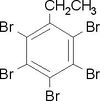Difference between revisions of "Pentabromoethylbenzene"
From Coastal Wiki
Dronkers J (talk | contribs) |
|||
| (8 intermediate revisions by 2 users not shown) | |||
| Line 1: | Line 1: | ||
{{Definition|title=Pentabromoethylbenzene (PBEB) | {{Definition|title=Pentabromoethylbenzene (PBEB) | ||
| − | |definition=Pentabromoethylbenzene is a brominated [[flame retardant | + | |definition=Pentabromoethylbenzene is a brominated [[flame retardant]]}} |
== Notes == | == Notes == | ||
{| class="toccolours" border="1" style="float: right; clear: right; margin: 0 0 1em 1em; border-collapse: collapse;" | {| class="toccolours" border="1" style="float: right; clear: right; margin: 0 0 1em 1em; border-collapse: collapse;" | ||
| − | ! bgcolor="#FF8888" | Pentabromoethylbenzene | + | ! bgcolor="#FF8888" | Pentabromoethylbenzene |
|- | |- | ||
| − | | align="center" bgcolor="#FFFFFF" | [[Image:PBEB. | + | | align="center" bgcolor="#FFFFFF" | [[Image:PBEB.JPG|100px|]] |
|- | |- | ||
| − | ! bgcolor="#8888FF" | Formula | + | ! bgcolor="#8888FF" | Formula |
|- | |- | ||
| align="center" | C<sub>8</sub>H<sub>5</sub>Br<sub>5</sub> | | align="center" | C<sub>8</sub>H<sub>5</sub>Br<sub>5</sub> | ||
| Line 19: | Line 19: | ||
PBEB was used in the 1970’s and 1980’s to make the thermoset polyresins found in circuit boards, textiles, adhesives, wires, cables, and polyurethanes, from which they continue to leak in the environment. | PBEB was used in the 1970’s and 1980’s to make the thermoset polyresins found in circuit boards, textiles, adhesives, wires, cables, and polyurethanes, from which they continue to leak in the environment. | ||
| − | PBEB is likely to be an extreme persistent chemical with a very high potential for [[bioaccumulation]]. There is however no data available on it's toxicity. | + | PBEB is likely to be an extreme [[persistent]] chemical with a very high potential for [[bioaccumulation]]. There is however no data available on it's [[toxic|toxicity]]. |
<ref name="th">[http://umu.diva-portal.org/smash/get/diva2:216812/FULLTEXT01 Jenny Rattfelt Nyholm 2009 Persistency, bioaccumulation and toxicity assessment of selected brominated flame retardants; Student Thesis, Umeå University] </ref> | <ref name="th">[http://umu.diva-portal.org/smash/get/diva2:216812/FULLTEXT01 Jenny Rattfelt Nyholm 2009 Persistency, bioaccumulation and toxicity assessment of selected brominated flame retardants; Student Thesis, Umeå University] </ref> | ||
<ref name="do">[http://www.sas.upenn.edu/~dbalmer/chem505/PIM04_BFR/PIM04_Brominated%20Fire%20Retardant_Balmer.pdf Doug Balmer & Dr. Hermanson: 2008 Brominated Fire Retardants: Pentabromoethylbenzene Chem 505] </ref> | <ref name="do">[http://www.sas.upenn.edu/~dbalmer/chem505/PIM04_BFR/PIM04_Brominated%20Fire%20Retardant_Balmer.pdf Doug Balmer & Dr. Hermanson: 2008 Brominated Fire Retardants: Pentabromoethylbenzene Chem 505] </ref> | ||
| Line 37: | Line 37: | ||
<references/> | <references/> | ||
| − | [[Category: | + | {{author |
| + | |AuthorID=19826 | ||
| + | |AuthorFullName=Daphnis De Pooter | ||
| + | |AuthorName=Daphnisd}} | ||
| + | |||
| + | |||
| + | [[Category:Toxicity chemicals]] | ||
Latest revision as of 13:31, 9 August 2020
Definition of Pentabromoethylbenzene (PBEB):
Pentabromoethylbenzene is a brominated flame retardant
This is the common definition for Pentabromoethylbenzene (PBEB), other definitions can be discussed in the article
|
Notes
| Pentabromoethylbenzene |
|---|

|
| Formula |
| C8H5Br5 |
PBEB was produced in the US until 1990, with a US production in 1986 between 4 and 226 tonnes. PBEB was used in the 1970’s and 1980’s to make the thermoset polyresins found in circuit boards, textiles, adhesives, wires, cables, and polyurethanes, from which they continue to leak in the environment.
PBEB is likely to be an extreme persistent chemical with a very high potential for bioaccumulation. There is however no data available on it's toxicity. [1] [2]
Environmental standards and legislation
Included in the OSPAR list of substances of priority action
References
Please note that others may also have edited the contents of this article.
|